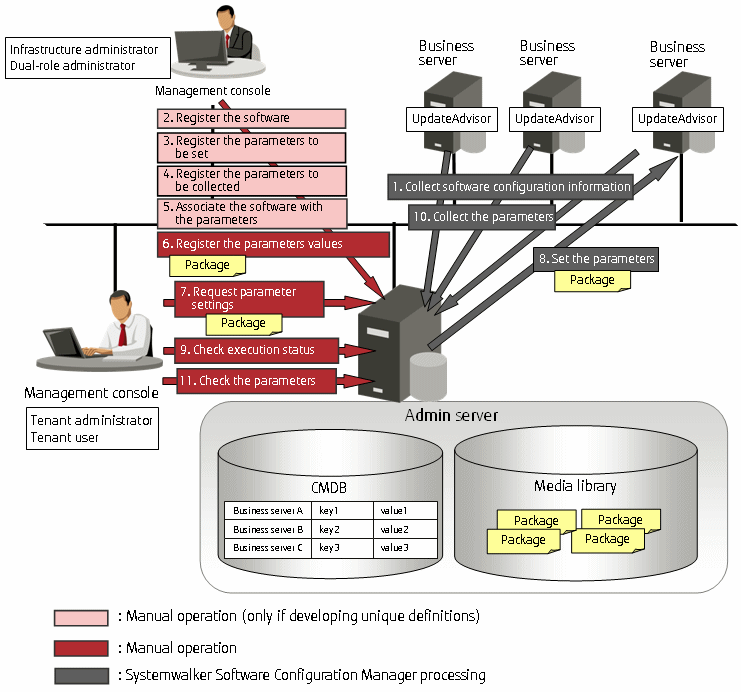The following diagram shows the overall flow of software parameters management.
Collect information on installed Fujitsu middleware using UpdateAdvisor (middleware).

Collect software configuration information [Systemwalker Software Configuration Manager]
Perform discovery on the managed servers to collect information on installed Fujitsu middleware. Fujitsu middleware information is collected by UpdateAdvisor (middleware).
Register the software [operation by the infrastructure administrator]
If managing software that is not compatible with UpdateAdvisor (middleware), use commands to register information about the software installed on the managed servers.
Register the parameters to set [operation by the infrastructure administrator]
The infrastructure administrator defines the parameters to set in the software. Specify the list of parameters, and the scripts to set the parameters, using the parameter setting definition. Use commands to register the parameter setting definition.
This step is not required if using the parameter setting definition pre-registered in this product.
Register the parameters to be collected [operation by the infrastructure administrator]
The infrastructure administrator defines the parameters to be collected from the software. Specify the list of parameters, and the scripts to collect the parameters, using the parameter collection definition. Use commands to register the parameter collection definition.
This step is not required if using the parameter collection definition pre-registered in this product.
Associate the software with the parameters [operation by the infrastructure administrator]
The infrastructure administrator associates the parameter setting definition and the parameter collection definition with the software. The software is associated with the parameters using commands.
This step is not required if using the software definition pre-registered in this product.
Register the parameters values [operation by the infrastructure administrator]
The infrastructure administrator can define the values to be set in the parameters as predefined parameters. Predefined parameters are convenient to use when the user needs to configure the same value numerous times, or when a set of values to configure has been predetermined. Files, as well as values, can be specified in parameters. Use commands to register predefined parameters. Note that files can also be registered as packages.
Request parameter settings [operation by the tenant administrator or the tenant user]
Either the tenant administrator or the tenant user logs in to the management console and requests parameter settings. Notifications that a request has been received, completed, or has ended in an error, are received by email.
Set the parameters [processing by Systemwalker Software Configuration Manager]
Systemwalker Software Configuration Manager configures the specified parameters in the managed servers.
Check execution status [operation by the infrastructure administrator, the tenant administrator, or the tenant user]
Check the parameter setting status using the management console or the job information management command.
Collect the parameters [processing by Systemwalker Software Configuration Manager]
Perform discovery on the managed servers to collect the software parameters. Files, as well as parameter values, can be collected.
Check the parameters [operation by the infrastructure administrator, tenant administrator or the tenant user]
Infrastructure administrators, tenant users, and tenant administrators log in to the management console to check the parameters.
The following table explains the operation flow for each role.
Operation flow | User roles | Reference | ||||
|---|---|---|---|---|---|---|
Infrastructure administrator | Dual-role administrator | Tenant administrator | Tenant user | |||
1 | Collect software configuration information | Y | Y | - | - | |
2 | Register the software | Y | Y | - | - | "Definition of Software Information" in the Developer's Guide "Software Information Management Command" in the Developer's Guide |
3 | Register the parameters to set | Y | Y | - | - | "Definition of Parameters to be Set" under "Definition of Parameter Information" in the Developer's Guide "Parameter Settings Definition Management Command" in the Developer's Guide |
4 | Register the parameters to be collected | Y | Y | - | - | "Definition of Parameters to be Collected" under "Definition of Parameter Information" in the Developer's Guide "Parameter Collection Definition Management Command" in the Developer's Guide |
5 | Associate the software with the parameters | Y | Y | - | - | "Association with the Software" under " Definition of Parameter Information" in the Developer's Guide "Command to Associate Software and Parameter Definitions" in the Developer's Guide |
6 | Register the parameters values | Y | Y | - | - | "Predefined Parameter Management Command" in the Reference Guide |
7 | Request parameter settings | - | Y | Y | Y | "Configuration Management" in the Operator's Guide |
8 | Set the parameters | - | - | - | - | - |
9 | Check execution status | Y | Y | Y (*1) | Y (*1) | Check the parameter setting status using the Task Management window on the management console (refer to "Task Management" in the Operator's Guide for details), or the job information management command (refer to "swcfmg_job (Job Information Management Command)" in the Reference Guide for details). |
10 | Collect the parameters | Y | Y | - | - | "Parameter Information Update Command" in the Reference Guide |
11 | Check the parameters | Y | Y | Y | Y | "Configuration Management" in the Operator's Guide |
Y: Implement the task.
-: Do not implement the task
*1: Only the Task Management window can be operated.